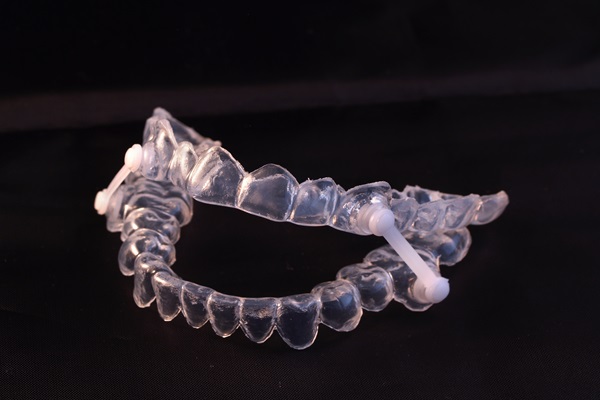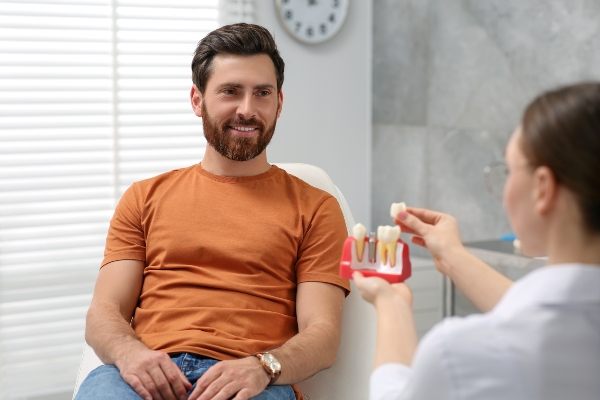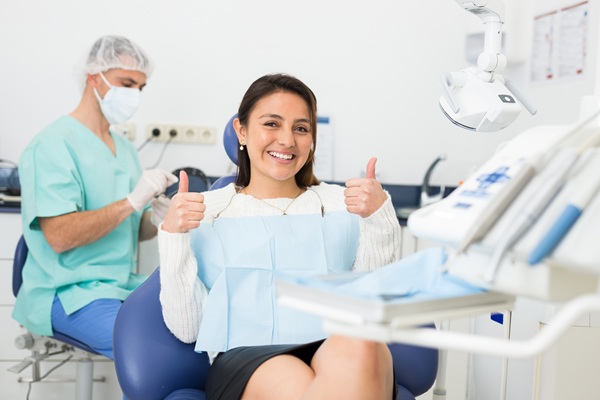How a Dentist Can Treat Sleep Apnea

Obstructive sleep apnea is the most common form of apnea and causes the upper airways to become partially or completely blocked during sleep. During an episode, the pressure to open the airway increases and causes the chest muscles to work harder. When breathing resumes, it may cause the person's body to jerk, which leads to less restful sleep.
OSA affects people of all ages, including infants, although it is most common in people who are overweight, obese, or over the age of 40. Someone with OSA is more likely to snore and feel fatigued during the day. The person may be more restless during sleep, wake up suddenly in the middle of the night, or have a sore throat upon waking. Other possible symptoms include night sweats, headaches, or sexual dysfunction. If left untreated, OSA can lead to hypertension, stroke, congestive heart failure, and even diabetes.
Treatment for obstructive sleep apnea
When a doctor diagnoses a patient with OSA, the first treatment option is usually a continuous positive airway pressure machine. However, a CPAP machine does not work for every patient. When it is not an option, the doctor will likely refer the patient to a dentist. A dentist can help by fitting the patient with an oral appliance.
Oral appliance therapy is especially helpful for patients who have mild to moderate OSA. Oral appliances help in one of two ways. Some of them are useful for blocking the tongue from falling back into the throat and obstructing the airways. Other devices are made to advance the lower jaw forward to create more breathing room and keep airways open during sleep.
Types of oral appliances for OSA
Tongue-retaining devices are soft plastic splints that you can place around your tongue. The device holds the tongue forward and out of your mouth while you sleep.
Mandibular advancement devices are hard plastic appliances that snap over your teeth. The device includes metal screws and hinges for you to tighten to push your lower jaw forward. Mouth guards can also reposition your lower jaw, but to a lesser degree than the mandibular advancement device.
What to expect during the fitting process
When a patient needs an oral appliance for OSA, the dentist will first make an impression of the patient's teeth. The device will then be made before the patient returns for a second appointment to do a fitting. When the device fits correctly, the patient will also receive a repositioner to use in the morning. This is to realign the bite, which often shifts slightly when wearing the appliance during sleep. In some cases, there is a third visit to further adjust the device and ensure it works correctly. Finally, a sleep test is often performed to see if the appliance improves the symptoms of OSA.
Benefits of oral appliance therapy
There are several benefits to using oral appliance therapy to treat OSA. In addition to improving problems during sleep, it may also help patients feel more awake during the day, have more level moods, and concentrate better. Using an oral appliance also makes traveling easier than if the patient were to take a CPAP machine everywhere. Finally, the device is quieter and does not require electricity to work.
Frequently asked questions
Before choosing oral appliances, many people have questions to understand their options better.
Do you have to retest for OSA while undergoing oral appliance therapy?
You do have to continue to have tests for OSA following the start of your oral appliance therapy. After you adjust to the device, you should go through another study to ensure that the device works.
How long do the devices last?
Be careful with your device to increase its longevity. Your device should last you for at least five years as long as you practice standard care.
Conclusion
Dentists can provide various treatment options for patients with sleep apnea, including mandibular advancement devices, mouth guards, and tongue-retaining devices. Oral appliances tend to be comfortable and convenient for patients. Many dental devices aim to reposition the jaw or tongue so that you have a clear upper airway.
Sleep apnea can put patients at risk of various health problems, including high blood pressure, heart disease, and depression. Often, patients recognize they have sleep apnea due to excessive snoring at night and fatigue during the day. People who suspect they may have sleep apnea or have been diagnosed with it should talk to their doctor and dentist to determine whether oral appliance therapy is a good option for improvement.
Request an appointment here: https://ericlarsondds.com or call Eric A. Larson DDS at (801) 871-8983 for an appointment in our Salt Lake City office.
Check out what others are saying about our dental services on Yelp: Sleep Apnea in Salt Lake City, UT.
Related Posts
Sleep apnea is a sleep disorder that causes breathing interruptions during sleep. This condition can reduce your oxygen levels and disrupt your natural sleeping patterns. If left untreated, sleep apnea can lead to serious health problems, such as constant fatigue and irregular heart rhythms. If you have been experiencing symptoms of sleep apnea, it is…
If you are struggling with sleep apnea, you need to address the condition right away. This is not an issue that will generally go away on its own. It is also a serious problem that can lead to severe health challenges. Luckily, your dentist is a good resource to turn to for help. Your dentist…
People with tooth loss can smile with confidence again, thanks to the help of an implant dentist. Tooth loss can greatly impact a person's quality of life, affecting how they speak, eat, and feel about their smile. Also, tooth loss can eventually lead to bone loss and changes in facial structure. Fortunately, an implant dentist…
Wisdom teeth extractions are a common dental procedure many individuals undergo in their late teens or early adulthood. These third molars lack room, causing them to emerge improperly or become impacted. This can lead to various oral health issues that affect your overall quality of life. Individuals who undergo this type of extraction should understand…


